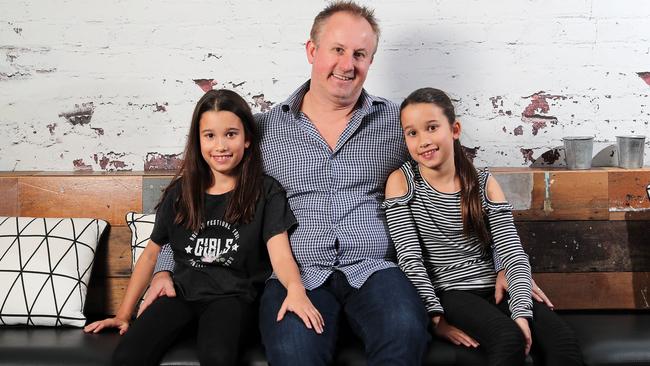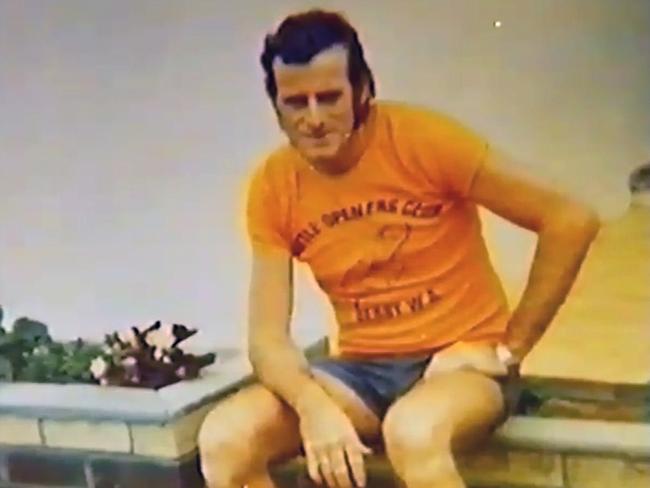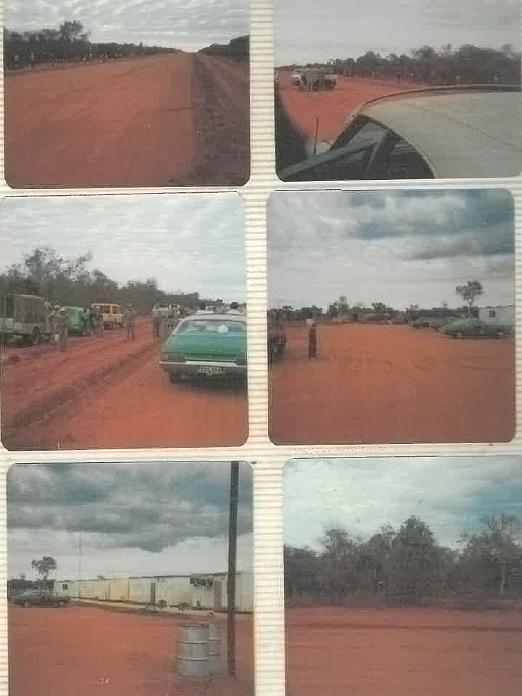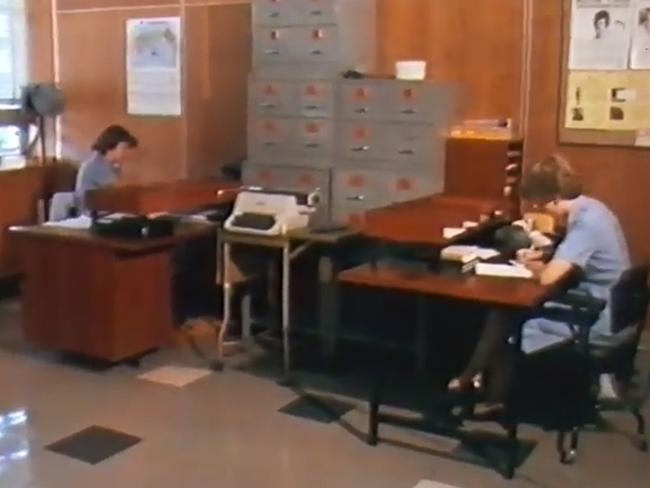Podcast creator’s long road to the truth about Des Carr’s 1979 disappearance
He’s a radio boss who creates podcasts for a living, but there was one story Jay Walkerden struggled to tell until his twin girls offered their take on the 40-year mystery that haunts his family.
True Crime
Don't miss out on the headlines from True Crime. Followed categories will be added to My News.
Jay Walkerden sat his 10-year-old twin girls Holly and Amelia down to ask them a question.
He was their age when, 40 years ago this month, his beloved uncle Des Carr went to work and never came home.
The Brisbane-based NOVA Entertainment radio executive remembered as a boy the disappearance talk, in hushed tones, usually through a veil of tears, in a pattern that over the years would dissipate but continue to eat away at his family.
There was nothing sinister as such about the disappearance on August 2, 1979 but it was a genuine mystery, surrounded by wild theories of UFO’s and strange lights, reports of amnesia, and foul play that normal salt of the earth families didn’t usually have to deal with, to have a missing person in their ranks and all the unanswered questions that brings.

So Walkerden’s question for his daughters now was part curiosity, part discovery to jolt his own memory of being their age and to remember what he thought back then, and how he reacted.
But unconsciously it was also perhaps a desire for validation, nay justification, for what he was about to broadcast.
“I would say, ‘Look out for him’, maybe put posters up telling (people) what he looks like, and I would tell all the people, text all the people I know, and send them a picture of what he looks like, to look out for him,” Holly said in a rush when asked by her father what she would do if she had lost a loved one.
And there it was.
Permission of a kind for Walkerden to open old family wounds, use his radio expertise as NOVA Entertainment’s national head of podcasting and Brisbane programming director, to use the tools not available back in 1979 to mount a fresh search for Des, to finish his podcast recording he started more than 12 months ago.
And not open fresh wounds but treat old ones not yet healed.
This week his podcast “The Disappearance of Des” leapt into the chart’s top six true crime listens, threw up some potential new leads and prompted a coroner to finally hold an inquest. Walkerden narrates the story but does not reveal his personal attachment until episode four, as if such a move would be an intrusion to the narrative, become too personal. His revelation though casts a new shade over the monologue — this is not just another cold case, but with the big reveal it’s a personal journey, the tone and emotion changes. References to Des Carr become “Uncle Des”, Walkerden tells of his mother’s mild dementia and trauma over the vanishing, the effect on those around him and his daughter’s sweet thoughts that did mirror his own 40 years ago.
The irony of a podcasting boss struggling with producing his own family story is not lost now on Walkerden.
This is not just another gripping five-part podcast on another faceless missing person — for the Carr family it is new hope and a fresh 21st-Century search for Des.

THE DISAPPEARANCE
Desmond Francis Carr was 38 years old and from all accounts an average knock about sort of bloke. He loved a beer, loved his footy and loved his family and lived for all three, in no particular order.
Des followed in his father Frank’s footsteps working for the Department of Main Roads in Western Australia.
It was a job he enjoyed less for the manual labour and more for the isolation and solitude the shifts afforded him.
In the year of 1979 he was based at the small Aboriginal outpost of Thangoo, 1600kms north of Perth, on the red earth trail that would become Australia’s longest stretch of bitumen — the 3200km Great Northern Highway.
“Des was a bit of a loner and he wasn’t afraid of being by himself which probably led him to working as a main road’s team where the hours were long but the money was good,” Walkerden said of his Uncle Des.

On the morning of August 2, 1979 Des woke as normal in his settlement camp, collected his kit, including water, and was driven by bus with his work mates to their designated area along the mapped out highway.
They would sometimes work in gangs or pairs or even solo, Des preferred the latter and on this day was tasked with the steam roller to flatten a 50km strip of earth for another crew to later come and pour over.
At 3pm the bus passed him and the driver waved as it moved further up the line to collect the men and work back toward Des and Thangoo.
An hour later at 4pm the bus returned; the steam roller engine was still grinding away but Des was not atop it. He was nowhere to be seen. His mates initially believed he may have clocked off early and decided to walk back to camp, but that was unlikely in 35C-plus heat.
Des Carr disappearance: Coroner to seek answers 40 years on
That night police were called for a missing person’s case.
Forty years later, members of his family are still wondering what happened.
“We weren’t necessarily close, but I remember him well,” Walkerden said of his uncle.
“To me, as a 10-year-old, he was a tall, lanky man, he was pretty quiet and not the sort of uncle you’d play football with in the backyard, but he was my uncle and more importantly my mum’s brother,” he said.
“I still have the image of him sitting on the front step of my grandma and grand-pop’s house in Leederville in Western Australia at Christmas in his orange top and black shorts as we all gathered for one of my grandma’s famous Sunday roasts with soggy vegetables and trifle for dessert.
“It’s the same photo you will see in the (podcast) cover art, that photo has been etched in my family’s mind for the last 40 years and pinned to missing persons board all over Australia.”
The head of podcasting said he had produced many podcasts over the past year, including the Police Tape series for True Crime Australia, but all the while he sat on the story closest to him. Why?

“I am not an investigative reporter,” he said. “I don’t have any journalistic background but I do have memories, memories of my mum Shirley crying a lot when I was young. She wouldn’t do it much around my brothers and me but she would be sad, the sort of deep sadness that may have faded over time, but is still there when we talk about Uncle Des.”
The success of some of his true crime episodes spurred him into action, he spoke to his mum and the memories came back, then he spoke to his own daughters and the validation was there. He now had the knowledge and power to take the search where his family couldn’t back in the 1980s, to go to greater depth than handing out flyers.
In the moving podcast, a now-frail 75-year-old Shirley recalls the mystery about her brother’s disappearance that her father, Frank, particularly refused to accept. Until his dying day, he would pronounce: “My boy will come home.”

The problem was there were no clues, literally not a boot print to go off. Despite the desert dirt, dozen of police and volunteers could not find a single footprint as they searched a radius on foot and by air of 100km.
“There were no tracks around … his manager said it’s like something just plucked him off, not stairs, someone’s just come down and pulled him up,” Shirley recalled.
There had been reports of UFOs in the outback sky about that time, no doubt spurred on by the fascination with NASA’s Skylab which fell to Earth in WA a month earlier, in July 1979.
Des himself told his sister he had seen lights in the sky that seemed to follow the road crew at night.
Walkerden has been buoyed by his family’s support, including cousins and uncle and aunties still living in WA, but said the podcast was unlikely to solve the mystery.
Through his research he did discover that in 2014 a truck driver came forward and belatedly revealed how he saw a man on that night walking along the unfinished road and drew a map for police where he spotted him, but more importantly would later find a sock there by the side of the road.
“Well for the last 30 years since I was a full grown adult, I’ve always wanted to be able to do something to help, but do I think this podcast will find Des?” Walkerden said. “No I don’t.
“I think it can bring awareness to Des being missing and the other 2500 other long-term missing persons … multiply that number by parents, siblings, friends, workmates who wake up every morning without an answer.”
Originally published as Podcast creator’s long road to the truth about Des Carr’s 1979 disappearance
